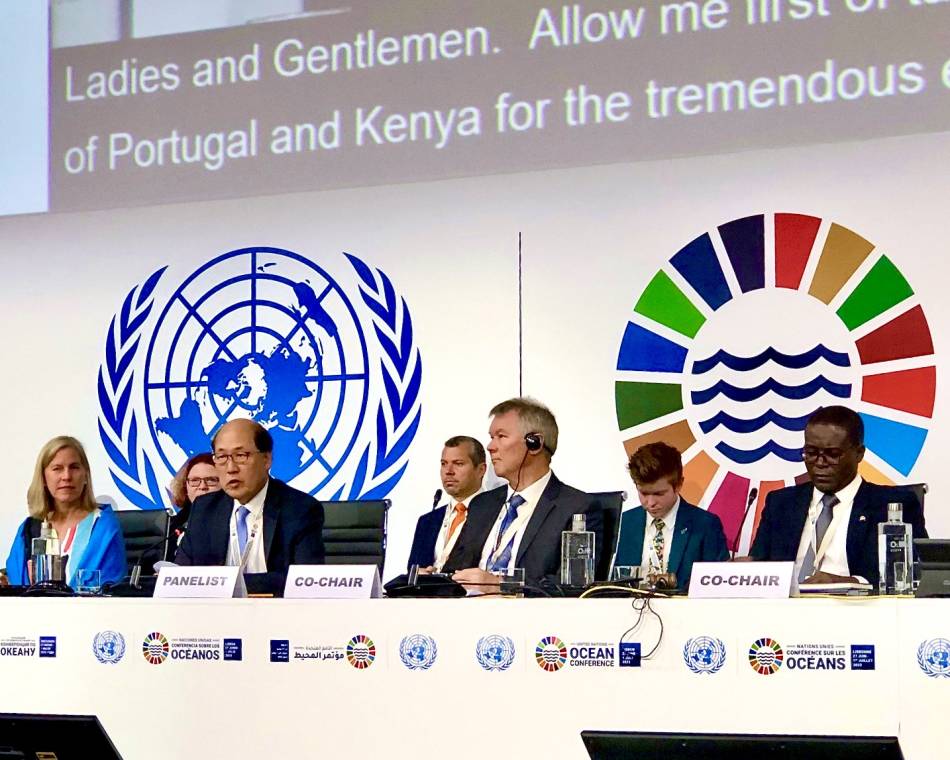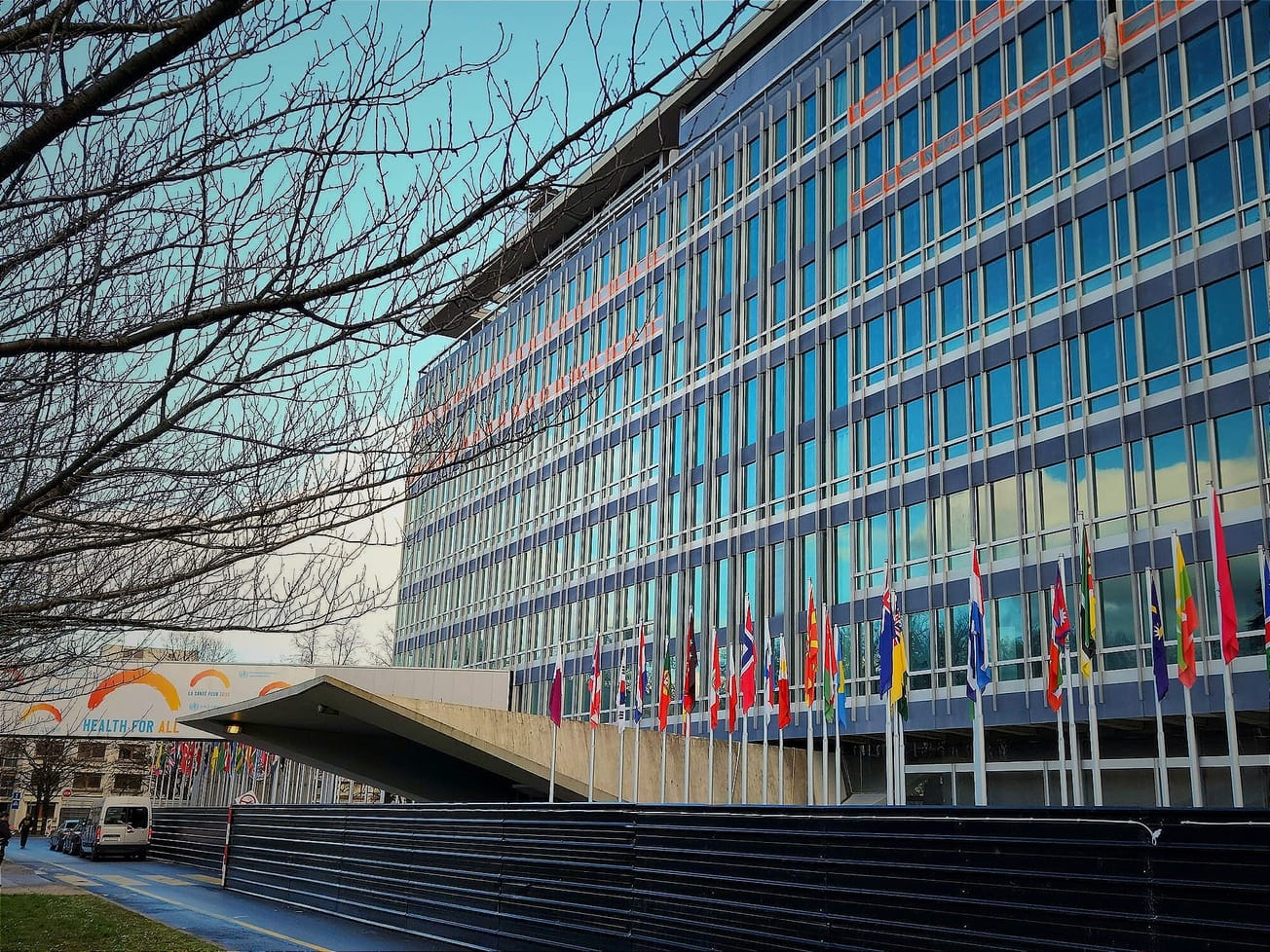More than 150 nations committed to put science at the heart of renewed efforts to tackle the multiple human-caused crises threatening the ocean — the lungs of our planet — that covers about 70 percent of Earth’s surface.
Delegates capped a five-day United Nations summit in Portugal's coastal capital Lisbon that ended on Friday with agreement on a 17-point Lisbon Declaration that says they are "deeply alarmed by the global emergency facing the ocean" and will take immediate steps to boost marine science and data collection, strengthen international law enforcement, and promote sustainable ocean-based economies inclusive of women and girls.
"Sea levels are rising, coastal erosion is worsening, and the ocean is warmer and more acidic. Marine pollution is increasing at an alarming rate, a third of fish stocks are overexploited, marine biodiversity continues to decrease and approximately half of all living coral has been lost, while alien invasive species pose a significant threat to marine ecosystems and resources," the declaration says. "We renew our commitment to taking urgent action and to cooperate at global, regional and sub-regional levels to achieve all targets as soon as possible without undue delay."
U.N. Secretary-General António Guterres, who is from Lisbon, spoke Portuguese at the start of a speech that called for urgent, unified action by quoting poet Fernando Pessoa's lines: “God wanted the Earth to be all one. That the sea unites, no longer separates.”
Referring to the "ocean emergency" the planet faces, he said, "Our oceans are issuing an SOS. They are struggling, heating and acidifying. Corals are dying. Coastal ecosystems, such as mangroves, seagrasses and wetlands, are being degraded. Fisheries are being depleted and the ocean is choking in plastic waste. We must work together to right these wrongs."
Turning things around, he said, will require no longer viewing the world as if its resources are endless. "It is time to stop neglecting the health of our oceans. It is not a rubbish dump. It is not a source of infinite plunder," said Guterres, a former prime minister of Portugal from 1995 to 2002. "It is a fragile ecosystem on which we all depend – for oxygen, for climate regulation and for food. We must take action. We must be focused on solutions."
The declaration calls for greater science-based efforts to reduce ocean pollution and acidification, cut greenhouse gases from maritime transport, and conserve coastal and marine areas while ending subsidies for harmful fishing practices. Nations say they also will do more to protect and restore ecosystems and to support Indigenous people and small-scale fishing.
It also acknowledges the world's failure to achieve one of the U.N.'s 17 Sustainable Development Goals for 2030 — the 14th goal, which calls on everyone to "conserve and sustainably use the oceans, seas and marine resources for sustainable development."
Liu Zhenmin, a U.N. undersecretary-general who heads the Department of Economic and Social Affairs, or DESA, said the world must renew its focus on ocean action. "We need to do this by focusing on improving the scientific basis for our decisions, by improving the science-policy interface, and by engaging in scientific partnerships that build capacity through mutual learning," he said.
The U.N. Ocean Conference, co-sponsored by Kenya and Portugal, drew 6,000 participants, including 24 heads of state and government leaders. Kenya's President Uhuru Kenyatta noted the first conference hosted by Sweden and Fiji in 2017 "raised an alarm on the urgent need to scale up action," and this second conference — originally scheduled for 2020, but postponed due to the COVID-19 pandemic — must help force people to face up to reality.
“Our actions are not commensurate with the threat that faces the ocean," Kenyatta said. "We urgently need to build an ocean-based economy where effective protection, sustainable production and equitable prosperity go hand-in-hand. These actions must be taken collectively because the ocean is a global common good."
Portugal's President Marcelo Rebelo de Sousa said the pandemic and Russia's invasion of Ukraine must not become an excuse for inaction. “Oceans are central in geopolitical balance of power,” he said. “We must recover the time we have lost and give hope a chance, once again, before it is too late.”
Fijian diplomat Peter Thomson, the U.N. secretary-general’s special envoy for the ocean, offered younger generations a blanket apology on behalf of everyone in power for not being a better ocean steward. “I want to repeat two things that the secretary-general said," said Thomson, referring to Guterres.
"The first was a deep, deep apology on behalf of our generation to the youth of the world and a commitment that we will spend our remaining years helping them identify and implement the solutions to get out of the terrible problems that we have created for them," Thomson said, drawing applause.
"Youth will no longer be sitting on the edge of conferences. It's their future we're deciding about," he said. "Henceforth, we have to bring suitably qualified youth professionals into the central table to make those decisions with us."
Starting with an apology from @ThomsonFiji and @antonioguterres to the youth of today for the current state of the ocean #SaveOurOcean #UNOC2022 pic.twitter.com/AwcugcA51W
— Sophie Benbow (@slpbenbow) July 1, 2022
A silver lining
Thomson's apology reflected a sense among younger generations that ocean protection is being paid lip service.
Outside Lisbon's Altice Arena, where the conference was held, police stopped Greenpeace International activists from trying to place large placards showing sharks being killed by political inaction and calling for adoption of a strong high seas treaty when talks resume in August. Instead, activists held banners outside the arena reading “Strong global ocean treaty now!” and “Protege os Oceanos."
Laura Meller, an oceans campaigner and polar adviser for Greenpeace Nordic, said leaders must finish the treaty this summer and start focusing on action, not words. “Our leaders are failing to deliver on their promise to protect the oceans," she said.
"While governments continue to say fine words about ocean protection, like they’re doing here in Lisbon, millions of sharks are killed every year by vessels from the European Union," said Meller. "The world must see through their hypocrisy. The treaty needs to be finalized in August, we don’t need more time to discuss how to protect the oceans, we need to get ocean protection done.”
Inside the conference, nations offered non-binding commitments to conserve or protect at least 30% of the global ocean by 2030 through the creation of more Marine Protected Areas and other area-based conservation measures. Nine philanthropic organizations behind the Protecting Our Planet Challenge pledged at least US$1 billion to help create, expand and manage those and Indigenous or locally-governed marine and coastal areas.
The Development Bank of Latin America announced US$1.2 billion to support projects to benefit the ocean in the region, while the European Investment Bank said it would spend €150 million (US$153 million) across the Caribbean region to improve climate resilience and management of water supplies and solid waste. And the Global Environment Facility approved a US$25 million grant towards Colombia’s marine protected areas.
In addition to the Ocean Conference, delegates to other organizations and treaties are taking major steps to address ocean-related concerns this year.
In March, the 175-nation U.N. Environment Assembly voted unanimously to devise a legally binding global treaty that attempts to cleanse the world of plastic pollution. The vote in Nairobi set the stage for an intergovernmental negotiating committee to begin work on a draft agreement.
And in June, the World Trade Organization reached general consensus on a long-stalemated deal aimed at halting government subsidies that contribute to overfishing despite some nations with big fleets such as China and India seeking exemptions. Many coastal communities worldwide depend on fisheries for food and livelihoods but must compete with government-financed industrial fishing vessels that draw down local fish stocks.
Proponents of a global high seas treaty — first proposed by the U.N. General Assembly in late 2017 to protect an immense segment of biodiversity against mounting commercial pressures — are set to resume talks in August with the goal of approving it as soon as possible.
Talks are set to resume in October on marine biodiversity that could also lead to strengthening governance of the high seas covering 43% of Earth’s surface that are international waters beyond the 200 nautical mile (370 kilometer) jurisdiction of coastal nations.
The next major U.N. climate summit, planned for November, is expected to include a focus on climate adaptation measures and financing needed to build ocean resilience.








